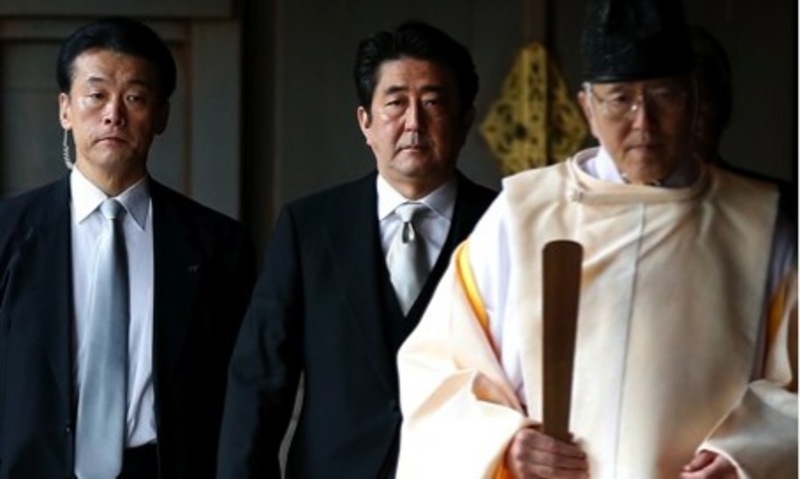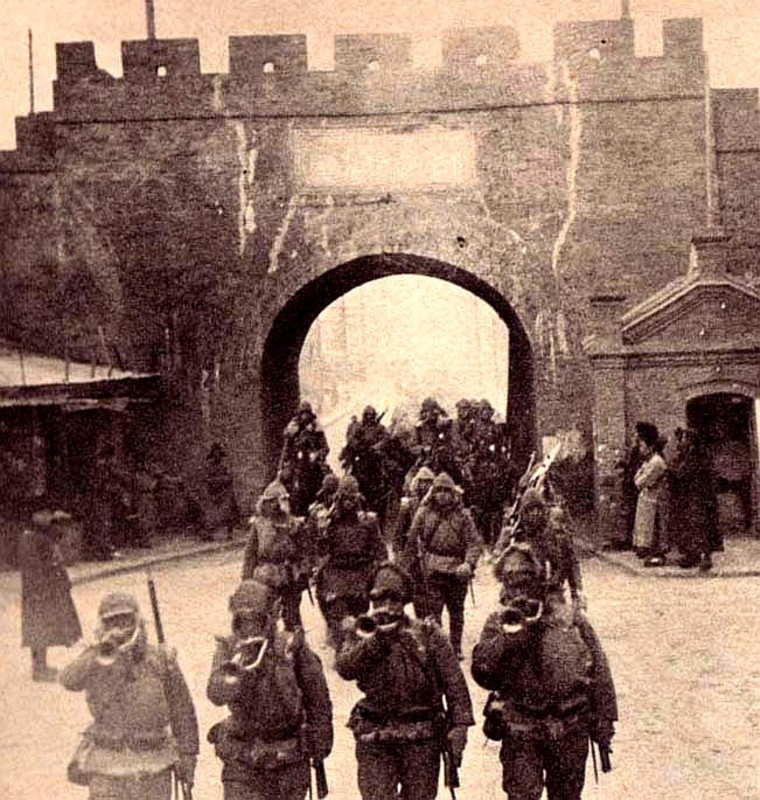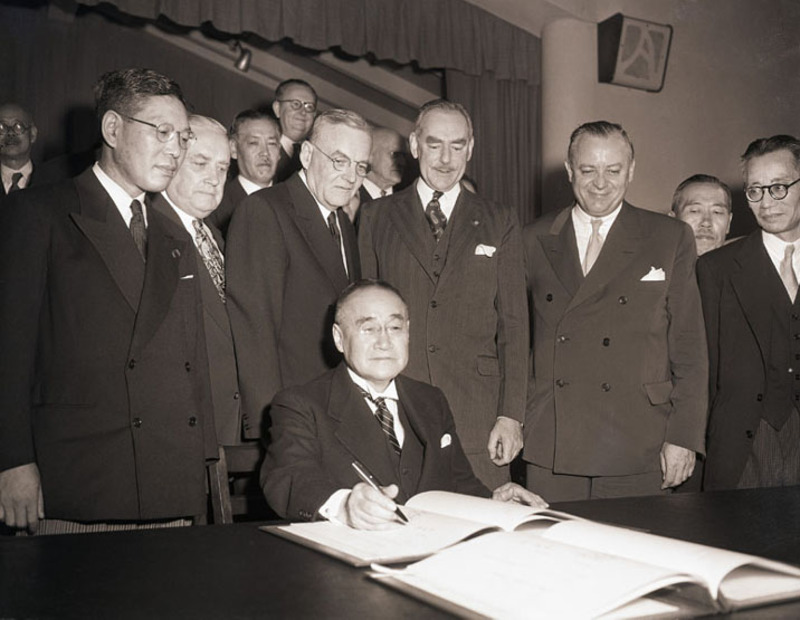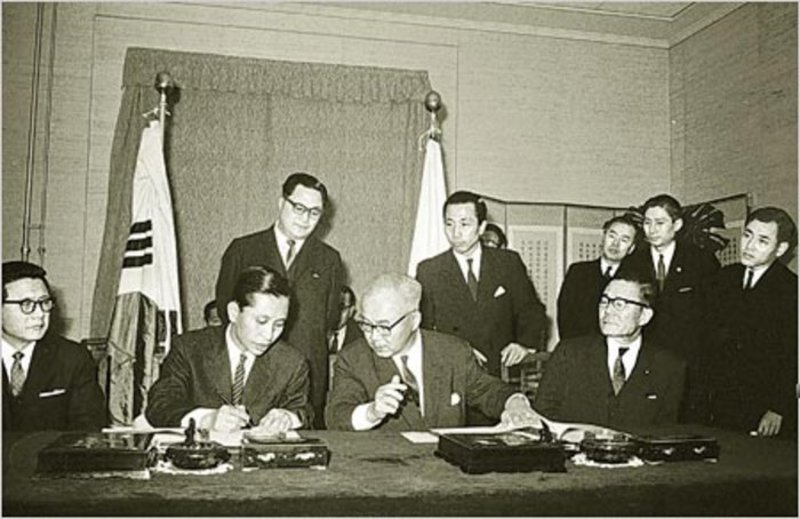Why Do the Japanese and Chinese Still Need to Keep Talking?
Introduction by Andrew Gordon
Andrew Gordon is a Professor of History at Harvard University.
I am delighted that this essay by my longtime colleague and friend, Hiroshi Mitani, can be brought to the attention of English language readers. It is also, of course, most welcome that the original Japanese version has recently been published on the Japanese Huffington Post website.
The essay has its origins in an email that Hiroshi Mitani sent to his colleague Murata Yūjirō, a well-known younger historian of modern China. The email was sent in response to Murata’s comments, after a recent symposium in Tokyo, to the effect that he was experiencing “reconciliation exhaustion” (和解疲れ; wakai tsukare), a short-hand reference to being tired of the continual need to search for common ground and reconciliation in his interactions with Chinese colleagues. Mitani shared with me his email response, which put forth the questions raised and addressed here. I felt it was an important statement worthy of presenting for public circulation, and I suggested that Mitani write this published version.
The longer backstory to this essay is important. Hiroshi Mitani is a historian of modern Japan at the University of Tokyo whose own research and writing has focused on the intellectual, political and diplomatic history of mid-19th century Japan, especially the last two decades of the Tokugawa era, and the early Meiji years. But for nearly two decades, he has been tirelessly involved in efforts to exchange ideas with historians throughout Asia, particularly in China and Korea, concerning the vexed history of Japanese imperialism and war of the late 19ththrough mid-twentieth century.
By his best recollection, Mitani has attended over forty bi-national and multinational symposia and conferences, most intensively since around 2001, some of which he organized himself, which have brought together historians from many countries, most notably Korea and China. That so many meetings have taken place is itself significant evidence that historians in East Asia have been putting much effort into working across borders toward shared understanding of the past. But Mitani has also written articles and edited books in collaboration with a diverse multi-national set of colleagues.1 He has also been a tremendously welcoming teacher and advisor to dozens of graduate students from other countries in Asia who have gained much from his rigorous seminars. There are few if any historians in Japan who have thrown themselves so fully and creatively into this effort to create a foundation of human and intellectual connections that might enable shared understanding of the tragic modern history of empire and war in Asia. Of course, in the process he has given much thought to the reasons why this effort is needed, and to the challenges such efforts face. This essay distills and presents some of his reflections on these matters.
It is also noteworthy that Mitani’s own intellectual background and training in history at Tokyo University was in the field of “national history” (kokushi), whose practitioners have generally worked separately from, and often critical of, historians on the left in Japan working in a Marxian tradition, who have been particularly vociferous in pressing for a full accounting in Japan of its war responsibility. Mitani’s efforts over many years, as well as this particular essay, are compelling evidence that voices from across the ideological and methodological spectrum in Japan are speaking out on behalf of open and honest grappling with the history of empire and war in the twentieth century.
In Japan today, a spirit of “dislike China; hate Korea” is widespread. Since the summer of 2012, when territorial disputes over the small Senkaku/Diaoyu and Takeshima/Dokto islands became the focus of diplomatic struggle with neighboring East Asian countries, and even more so since the real possibility has emerged of an armed clash with China, a view has spread in Japan that denies the need to keep talking about historical understanding of the first half of the twentieth century. With a sense of impending crisis, and feeling themselves now victimized by their neighbors, people are closing their ears to voices from neighboring countries that criticize Japan for a history now 70 or more years in the past.
At the same time, China’s president, Xi Jinping, has recently started a campaign that brings to mind the international relations of 1945 as it renders the alliances and enmities of that time the basis of today’s international order. Ignoring the historical fact that Japan has not once gone to war since the end of World War II, his appeal equates the Japan of today with the Japanese empire of that time.
Prime Minister Abe visits Yasukuni Shrine.
Amidst these tensions, at the end of 2013 Japan’s Prime Minister, Abe Shinzō, visited the Yasukuni shrine. This was an act that validated Xi’s claims and could not help but damage trust of Japan around the world. But it is hard to say that public opinion in Japan has recognized the danger of his visit. Rather, the more the criticism from neighboring countries, the greater the mood in Japan that supports actions to oppose these critics. Without question, the lack of any large-scale movement to oppose the huge change in the interpretation of Japan’s constitution concerning “collective self defense” stems from anxiety over Japan’s security. In this atmosphere, it is not surprising that it has become difficult to bring up for discussion events now over 70 years in the past.
And yet, for the sake of Japan’s present and future, the topic of historical understanding demands our attention. At a time when China is emerging as a major military power, with open ambition for hegemony, Japan cannot face this challenge alone. Japan’s security is only possible with support from other countries, beginning with the United States. To this end, it is necessary to secure the world’s trust in Japan. And to achieve this, it is essential that Japan properly deal with its wrongful acts of the first half of the twentieth century. In addition, the question of “historical understanding” continues to weigh heavily on Japanese people today. Despite their striving for a postwar peace, Japanese people have been destined to sit continually in the historical defendant’s chair. For Japanese people now and in the future to live with pride and at peace with themselves, it is crucial to lighten this burden of the past.
In this essay, venturing into areas considered taboo by many, I hope to rethink the question of what considerations are needed in our approach to “historical understanding.”
1. Why do Japanese people today face questions of responsibility for actions taken from the time before they were born?
In the first half of the twentieth century, Japan invaded and ruled neighboring lands. In contrast to the periods before the first Sino-Japanese war (1894-95) and after the end of World War II, Japan held colonial territories and did not hesitate to use military force toward its neighbors.
Japanese forces march into Mukden (Manchuria) September 18, 1931.
Over the past twenty years, the Republic of Korea and the People’s Republic of China have pressed the Japanese to reflect and apologize for this past. In East Asia today, the expressions “history problem” and “historical understanding” do not refer in a general way to the interpretation of history. They carry a very particular meaning of “questioning Japan’s responsibility for this past.”
But a profound ethical issue lurks in these expressions. Almost no Japanese people living today have any experience or memory of taking part in harmful acts toward neighboring countries. A person born in 1945 is 69 years old in 2014. Obviously, no one born in postwar times took part in acts of war or colonial rule, including atrocities such as the Nanjing massacre or the “comfort women” system. Today’s young generation, for example those age 20, is being made responsible for crimes committed far in the past by the generation of their grandparents. Similarly, generations have passed for people in neighboring countries. Most of those who are now criticizing Japan did not experience suffering at Japanese hands.
Here lies the problem of the generation gap between those with responsibility for past acts and those who are now being criticized. Today’s Japanese youth wonder why they—who did not victimize others and bore no responsibility—should be criticized by members of their own generation in neighboring countries who were not themselves directly victimized. This situation lies at the root of the acts of Japanese young people who refuse to recognize the existence of a problem of “historical understanding,” or ignore the concerns raised by people of neighboring countries, or sympathize with acts of hate speech. (At the same time, from a purely logical perspective, Japanese young people today have the right to criticize the older generation in Japan for having failed to sufficiently apologize or pay appropriate reparations to neighboring countries).
In criminal law if, for example, one’s grandfather commits a murder and then disappears, the grandchild is not arrested and punished in his place. This would be a severe violation of human rights. Is there a difference in the matter of inherited responsibility in a family, compared to the case of a state?
A murder by a grandfather is not ordinarily seen as an act carried out to sustain the family. Putting aside the time when a morality of revenge in defense of a family unit might have obtained, in the present day murder is treated as an individual’s act. In contrast, a murder or invasion carried out by a state is done in the name of supporting and developing that state. To the extent, therefore, that this state continues to exist, those who are born and raised in that nation continue to bear responsibility. Someone who does not wish to accept that responsibility has the choice of renouncing citizenship.
At the same time one sometimes hears the opinion that the state which has carried out large-scale acts of atrocity should be destroyed. Even if they do not put such thoughts into words, one imagines there are people in Japan’s neighboring countries who feel this way. But this would mean yet another holocaust. People do not choose the family or the country in which they are born. It is inhumane to punish innocent people on account of their place of birth or nationality.
Therefore, responsibility for historical offenses must be borne by the state itself. If wrongdoing at the level of the state is left unaddressed, then the further one moves into the future, the more unfair it is for the citizens of that state to carry the burden of the past. In general one can say that any individual will make greater or lesser mistakes in life. If there are no methods laid out to compensate for them, the crimes will accumulate and fester. The reason people can sustain an ordinary social existence is that methods do exist to recognize crimes, apologize for them, and make compensation. The situation at the state level is the same. In the case of twentieth century Japan, the Tokyo war crimes trial, the peace treaty of 1952, as well as the treaties and joint declarations with the Republic of Korea and the People’s Republic of China were rites of passage for Japan’s return to international society. These were possible only with the premise of making clear the responsibility of the leaders of the Asia-Pacific war and punishing them. However sloppy the proceedings at the Tokyo war crimes trial, to deny its outcome is to destroy the foundations of the restored international relations. If someone nevertheless ventures to do this, one cannot forget that the former victims would gain the right to retaliate.
Prime Minister Yoshida Shigeru signs the US-Japan Security Treaty, March 8, 1951, with John Foster Dulles and W. Averill Harriman looking on.
In sum, Japanese people born in the postwar era have no responsibility as individuals for the crimes of their ancestors. But, so long as they are members of the nation state, the responsibility to carry forward such responsibility and make amends is inescapable. It is the leaders of that state who bear that responsibility and must create the basis for reconciliation. It is necessary for politicians to be solemnly aware of the responsibility of the state and the nation.
2. Why are only mass murders by foreigners treated as problems, while those committed by members of the same country are not called into question?
Looking only at the case of China, the number of foreign people killed by the Japanese in the first half of the twentieth century is at the very least in excess of five million, and it possibly reaches as high as about ten million.2 This stands as one of the largest episodes of massacre in human history. At the same time, the number of Chinese murdered by other Chinese is hardly small. After the Cultural Revolution ended, Marshal Ye Jianying told the Central Committee of the Chinese Communist Party that 20 million people were killed in the ten years of the Cultural Revolution. Some sources attribute to him a claim of ten million victims, but in either case, there is no question that he acknowledged a huge number of people died unnatural deaths.3 If one reaches back further to the Great Leap Forward, the war between the Nationalists and Communists, and the various fights among warlords, the number who perished since the Republican Revolution of 1911 whether in civil war, internecine conflicts or starvation, is not that different from the number killed by the Japanese military. From any humane perspective, these are all examples of the extreme violence of the twentieth century.
Yet in China today, it is only the victims of the Japanese who are spoken of; those who were sacrificed to internecine violence are not discussed. Why is this? If people in China who experienced the Cultural Revolution were to begin speaking openly about that time, China’s social order could not be maintained. All parties remember who did what in an era when everyone, even children, was both victimizer and victim. To maintain social order in China, those who live in the society must remain silent. The leaders of all states often stress their nation’s victimization by foreign countries to cover up struggles among their own people. From a humanitarian perspective it is a problem to discriminate among foreigners and one’s own people and apply a double standard, but this sort of opportunism of the state is a commonplace tactic of politicians. Just like the Cambodian genocide, in the case of the Cultural Revolution until the generation which experienced the tragedy has passed on, maintaining silence is the only way to avoid further destroying the society. To a certain extent it is possible to understand that in such cases conventional morality does not apply. But what of the civil wars of earlier times? It is hard to believe that investigating those sacrifices would cause the social order to collapse.
Even so, for Japanese people such as myself to pursue discussion of atrocities committed among Chinese people is not appropriate. Even if one were to impartially and fully research the atrocities committed by Japanese against foreigners, and then criticize the Chinese from a humanitarian value standpoint transcending nationality, this would not legitimize an active examination of facts those foreigners do not want made public. Insofar as Japanese people carry forward some degree of responsibility for the offenses of their ancestors, it is necessary for us to act with circumspection ourselves.
Having said all that, it is hard to call it a fair or a civilized attitude to apply a double standard in discussions of victimizer and victimized, whether one closes one’s eyes to crimes among those of the same country or ignores cases in which one’s own country victimized a foreign nation.
3. Can a path toward reconciliation be opened simply by clarifying historical facts?
Over the past twenty years, people all over East Asia including Japan have energetically conducted research into the wrongful acts by Japanese people in the first half of the twentieth century. Thanks to that, when some Japanese from time to time make statements that deny invasion or defend Japan’s conduct in the Asia-Pacific War, it is possible to quickly criticize them based on good evidence. It would seem that, from this perspective, the goal of preventing “the return of Japanese militarism” has been more than achieved.
But has this in fact contributed to peace and stability in East Asia? Researchers have concentrated their attention on the harmful acts of Japan in the first half of the century, and have given scant attention to the self-restraint and the efforts on behalf of peace by Japanese in the second half of the century and in the new millennium. As a result, in neighboring countries, Japanese people today are often seen to be the same as the Japanese of the imperial era. They tend to be viewed as a constant threat. At the same time, not a few postwar Japanese people who have learned from experience and not once gone to war are surprised at this view from their neighbors and feel powerless to respond to this neglect of their own efforts at peace. Research into the history of the first half of the twentieth century was carried out with the expectation it would guarantee peace, but it is hard to say that it has contributed to reconciliation between the Japanese and their neighbors. Without efforts toward reconciliation on both sides, such research can in fact function to support further conflicts and bad feelings between Japan and its neighbors.
Korean Foreign Minister Lee Tong-won (left) and Japanese Foreign Minister Shiina Etsusaburo (right) sign the 1965 Treaty establishing ROK-Japan relations.
The irony of this sort of empirical research is also seen in studies concerning the postwar normalization of diplomatic relations, which was the first step toward reconciliation. The 1965 treaty between Japan and South Korea, and the supplementary agreements to it, planted seeds of the present conflict between Japan and Korea. Issues such as that of the “comfort women” were ignored at the time of the treaty, and these once unrecognized problems are now being raised by the South Korean side. At the time the treaty was concluded, the Japanese side paid $[US]300 million dollars and made various loans. In addition, both sides agreed that all claims—and rights to raise claims—were settled in the treaty. However, some of the above-noted, newly raised issues cast doubt on the treaty itself. The Japanese side calls the payments made in 1965 not reparations but “gifts celebrating Korean independence” or “economic cooperation payments,” and Korean discontent with this is a continuing irritant in the bilateral relationship. At present, when specific issues are brought up, the discussion reaches back all the way to the interpretation of the treaty itself, which was supposed to have created the foundation for reconciliation, and this tends to only deepen the conflict between the two countries.
What should we do to resolve this diplomatic confrontation and move toward true reconciliation? Without doubt, we cannot solve the problem by yet closer examination of the situation on both sides at the time the treaty was concluded. Trying to decide which side’s contentions are correct and which are not will only intensify the mud slinging. If we truly desire reconciliation, we must shelve the debates of 1965, and give a new meaning to those agreements. I propose that we work to build a consensus that the payments Japan made to Korea at that time were state-to-state reparations for “colonial responsibility.”4 In today’s international law, there is no legal principle of “colonial responsibility.” But there is no possible way to explain Japan’s actions in 1965 without this sort of principle. To the extent that there are no countries in the world which recognize that Japan and Korea were at war during World War II, the Korean contention that these payments were war reparations does not hold. But was the Korean side then and now not most fundamentally seeking from Japan recognition of its “colonial responsibility”? With hindsight, it appears that the two countries in 1965 were creating a new principle of international law of colonial responsibility.
Until today, no nation has formally recognized its “colonial responsibility”—not Britain toward India or Malaya, not France toward Vietnam, not the United States toward the Philippines. But that does not mean that we in East Asia must do the same. If we were to instead stop following the West, and ourselves create a new principle of international law, that would not only open a path toward security and reconciliation in bilateral relationships marked by never-ending tension. Would it not also be praised as a creative act offering a new model to the world?
There is no need to revise the agreements of 1965. Neither is there need to cover up the confrontations of that time. These agreements should be respected as the hard-won fruits of serious engagement with challenging issues by both sides under that era’s severe constraints. But, what is needed now is to create a new framework that will allow us to solve problems that have arisen since that time. We need a new social contract that dares to free us from the constraints of history. We can freeze the past in what we might call a transparent coffin and make a new departure from a foundation built upon it. That is, while continuing to remember the facts of the past as such, we can also create and prioritize a new narrative. Is there any other path toward reconciliation?
Rewriting historical memory is a commonplace tactic for the political abuse of history. To prevent that, it is of critical importance to search widely for historical documents, read them critically, and make them public. But that alone will not let us shift toward reconciliation of our differences. Is there any road toward reconciliation other than creating and remembering new narratives on a different level, narratives which can be shared by all of us?
Notes
1 One of these was published in English translation, Toward a History Beyond Borders: Contentious Issues in Sino-Japanese Relations (Cambridge, Ma.: Harvard University Asia Center, 2012), edited by Daqing Yang,Jie Liu,Hiroshi Mitani, andAndrew Gordon.
2 臼井勝美『新版 日中戦争』中公新書、2000年、208-209頁。三谷博『愛国・革命・民主』筑摩書房、2013年、第1章。 Usui Katsumi, Shinpan: Nisshin sensō. Chūō shinsho, 2000, pp. 208-209. Mitani Hiroshi, Aikoku, Kakumei, Minshu. Chikuma shobō, 2013, Chapter 1.
3 李英著、小島晋治編訳『中国民主改革派の主張 中国共産党私史』岩波現代文庫、2013年、124,270頁。Li Ying, Chūgoku minshu kaikaku ha no shuchō: Chūgoku kyōsantō shishi. Edited and translated by Kojima Shinji. Iwanami bunkō, 2013. Pp. 124, 270.
4永原陽子『「植民地責任」論――脱植民地化の比較史』(青木書店, 2009年). I am here informed by the general concept of “colonial responsibility” as articulated by Nagahara Yoko, “Shokuminchi sekinin”ron: datsu shokuminchika no hikaku shi. Aoki shoten, 2009.



